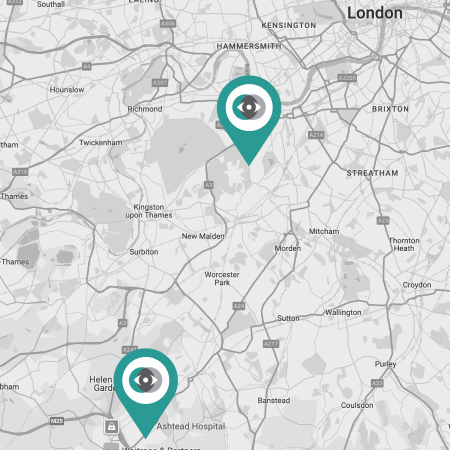
Do both eyes get treated at the same time in cataract surgery?
If you have cataracts in both eyes, it’s natural to wonder: can both eyes be treated at the same time? The short answer was previously not. Cataract surgery is almost always done one eye at a time, even in private care in the past but since the pandemic it is now accepted as safe practice worldwide.
In this post, we’ll explain why cataract surgery is typically staged between eyes, how long the wait usually is, especially in the NHS, and what to expect during the process. We'll also cover how private cataract surgery with Professor Paul Ursell can give you a quicker, smoother path to full visual recovery.
Why cataracts affect both eyes
Cataracts usually form as part of the ageing process, and they tend to develop in both eyes. That said, the rate of development can vary—one eye might become significantly worse than the other first.
If you’re beginning to notice blurry vision, glare from lights, or trouble reading or driving, it’s possible both eyes are affected to some degree.
Why aren’t both eyes operated on together?
Although it may seem convenient to have surgery on both eyes at the same time, surgeons used to recommend a short gap between procedures but now you can have both eyes corrected on the same day if you wish. Here’s why:
1. Safety first
Doing one eye at a time allows your surgeon to monitor healing and ensure there are no complications before proceeding with the second eye. While complications are rare, this approach protects your overall eye health. However modern surgery has now been demonstrated to be so safe that this is not a relevant consideration so its considered acceptable for both eyes to have surgery on the same day if you wish. Extra precautions are taken inthe operating theatre to maximise safety.
2. Accurate lens planning
The outcome of the first surgery can help guide the fine-tuning of the second eye’s lens choice, especially if you’re receiving a premium lens to reduce your reliance on glasses.
3. Comfortable recovery
Having one eye healing at a time makes it easier to function during recovery. You can rely on your untreated eye while the first eye adjusts. However the recovery s so fast with modern techniques often people opt for surgery on the same day to reduce the down time before returning to normal activities.
How long is the wait between surgeries?
In private care, you can usually have the second eye treated within a week or two or sooner if needed. You won’t have to wait months between eyes, as is sometimes the case on the NHS.
This means you can achieve balanced, clear vision quickly and return to your normal routine without long gaps between treatments.
What is the process like?
Here’s what you can expect with private cataract surgery under Professor Paul Ursell:
- Initial consultation
You’ll undergo detailed scans and a full visual assessment of both eyes. A treatment plan will be made for each eye. - First eye surgery
The first eye will be treated with your selected lens implant. Recovery is typically quick—most people notice improved vision within 24–48 hours. - Follow-up appointment
A review of the first eye confirms good healing and visual outcome. - Second eye surgery
The second eye is treated shortly after. The same careful planning and lens selection apply. - Final review
A final follow-up ensures both eyes are healing well and your vision is balanced and stable.
Can both eyes be done on the same day?
In the UK, simultaneous bilateral cataract surgery (both eyes on the same day) is often performed across the world since the pandemic.
Prof Ursell has performed research on patient preferences for either one procedure or two on the same day and the split is approximately 50/50 between the two options. It is always the individual's preferences that decides which to take.
What about vision in between surgeries?
In the short time between surgeries, you may notice some visual imbalance, especially if the first eye now sees clearly and the second does not.
However, this is usually manageable. Your brain adapts quickly, and once the second eye is treated, your vision feels much more natural and balanced again.
Can I wear glasses between surgeries?
Yes. If needed, temporary adjustments can be made to your glasses, or you can use reading glasses during the short gap. Your care team will guide you through this.
Benefits of treating both eyes promptly
- Restored binocular vision (using both eyes together)
- Better depth perception
- Reduced reliance on glasses if using premium lenses
- Improved overall confidence and comfort.
- Improved convenience and less downtime.
Final thoughts
While cataract surgery was almost always done one eye at a time, the process is quick and well-managed—especially in private care. With Professor Paul Ursell, your second eye can be treated within days, and you’ll be guided through every step of your recovery. If you wish, however, the option of two procedures on the same day is perfectly acceptable.
The goal is always clear, comfortable, and balanced vision, with no unnecessary delays.
Take our suitability self-test today to find out if private cataract surgery is right for you.
Are you suitable for vision correction surgery?
It isn’t suitable for everyone.
The first step is to book an assessment so you can find out whether you can benefit.
Our most popular procedures
What our patients say…
★ ★ ★ ★ ★“Excellent result. Complete confidence in Paul Ursell. Quiet, quick, and efficient. Peaceful and comfortable hospital.”
★ ★ ★ ★ ★
“The cataract surgery on both of my eyes went very smoothly without any problems. There was no pain afterwards and I didn’t have to wear any eyepatch. I would highly recommend Professor Ursell for cataract surgery.”
★ ★ ★ ★ ★“Highly professional, extremely efficient, and an excellent communicator, Paul exudes experience, knowledge, and ability. The whole process — initial consultation, operation, and post-op check-up — was wonderfully stress-free. I now have 20/20 vision, am glasses-free, and I am delighted by the results.”
★ ★ ★ ★ ★
“The cataract surgery has completely changed my life. Mr. Ursell put me at ease and explained all options. The procedure was quick and painless and completely successful, and I now have 20/20 vision in my good eye. One of the reasons I had the surgery was because of Mr. Ursell’s standing and experience. Cannot praise highly enough.”
★ ★ ★ ★ ★
“I was very short-sighted and my cataracts badly affected both reading and distance acuity. After the operation I now have very good distance vision (glasses-free) but still need glasses for reading. (This was the expected outcome as I did not want multi-focus implants). The operation was quick and painless, and I had no post-operative discomfort at all (which surprised me). The results are remarkable.
I can certainly recommend Professor Ursell. He is a personable consultant and a skilled surgeon.”
★ ★ ★ ★ ★
“Dr. Paul Ursell squashed many of my concerns for not having cataract surgery. He offered comfort with examples of his long/distinguished career and new technology that he applies to the surgery.
Both before and after the surgery, Dr. Ursell and staff gave me the information and attention I needed. It was a great success, and I highly recommend Dr. Ursell.”
We have replaced the images of real patients who provided these testimonials to protect their privacy.








